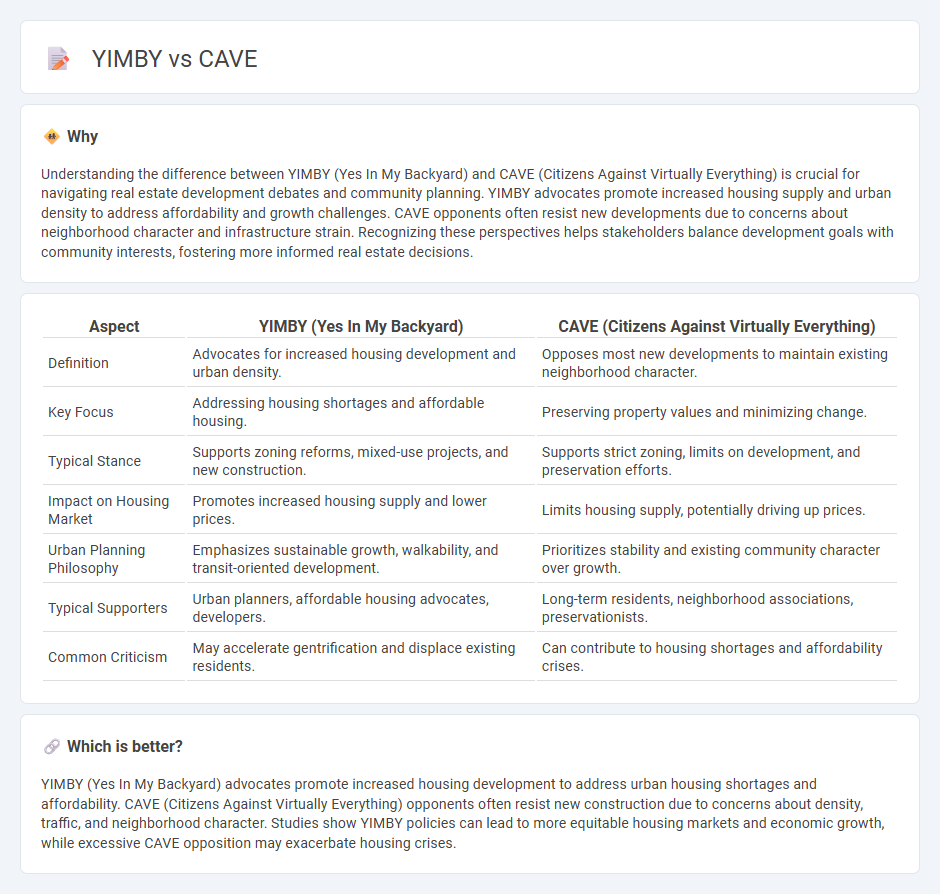
YIMBY (Yes In My Backyard) advocates support increased housing development to address urban housing shortages, promote affordability, and stimulate economic growth. CAVE (Citizens Against Virtually Everything) groups often oppose new construction projects due to concerns about environmental impact, neighborhood character, and property values. Explore the key arguments and data shaping the YIMBY versus CAVE debate in real estate development.
Why it is important
Understanding the difference between YIMBY (Yes In My Backyard) and CAVE (Citizens Against Virtually Everything) is crucial for navigating real estate development debates and community planning. YIMBY advocates promote increased housing supply and urban density to address affordability and growth challenges. CAVE opponents often resist new developments due to concerns about neighborhood character and infrastructure strain. Recognizing these perspectives helps stakeholders balance development goals with community interests, fostering more informed real estate decisions.
Comparison Table
| Aspect | YIMBY (Yes In My Backyard) | CAVE (Citizens Against Virtually Everything) |
|---|---|---|
| Definition | Advocates for increased housing development and urban density. | Opposes most new developments to maintain existing neighborhood character. |
| Key Focus | Addressing housing shortages and affordable housing. | Preserving property values and minimizing change. |
| Typical Stance | Supports zoning reforms, mixed-use projects, and new construction. | Supports strict zoning, limits on development, and preservation efforts. |
| Impact on Housing Market | Promotes increased housing supply and lower prices. | Limits housing supply, potentially driving up prices. |
| Urban Planning Philosophy | Emphasizes sustainable growth, walkability, and transit-oriented development. | Prioritizes stability and existing community character over growth. |
| Typical Supporters | Urban planners, affordable housing advocates, developers. | Long-term residents, neighborhood associations, preservationists. |
| Common Criticism | May accelerate gentrification and displace existing residents. | Can contribute to housing shortages and affordability crises. |
Which is better?
YIMBY (Yes In My Backyard) advocates promote increased housing development to address urban housing shortages and affordability. CAVE (Citizens Against Virtually Everything) opponents often resist new construction due to concerns about density, traffic, and neighborhood character. Studies show YIMBY policies can lead to more equitable housing markets and economic growth, while excessive CAVE opposition may exacerbate housing crises.
Connection
YIMBY (Yes In My Backyard) advocates support increased housing development to address urban housing shortages, while CAVE (Citizens Against Virtually Everything) resist changes to neighborhood character and zoning regulations. The tension between YIMBY and CAVE groups shapes local real estate markets by influencing zoning laws, housing supply, and property values. Understanding this dynamic is crucial for developers, urban planners, and policymakers striving to balance growth and community interests in real estate development.
Key Terms
NIMBY (Not In My Backyard)
CAVE (Citizens Against Virtually Everything) and YIMBY (Yes In My Backyard) represent opposing community responses to development, with NIMBY (Not In My Backyard) embodying local resistance to new projects despite acknowledging their benefits. NIMBY attitudes often slow urban growth, affecting affordable housing and infrastructure improvements crucial for sustainable cities. Explore how NIMBY dynamics impact metropolitan planning and housing policies in greater detail.
Zoning
CAVE (Citizens Against Virtually Everything) groups often oppose zoning changes, citing concerns over neighborhood character and property values, while YIMBY (Yes In My Back Yard) advocates push for relaxed zoning regulations to increase housing supply and affordability. Zoning policies, including single-family zoning and land-use restrictions, significantly impact urban density and housing availability, making them central to the housing debate. Explore how zoning reform can balance community interests and housing needs.
Housing Density
CAVE (Citizens Against Virtually Everything) groups often oppose increased housing density due to concerns about neighborhood character, traffic, and property values, advocating for restrictive zoning policies. YIMBY (Yes In My Backyard) advocates promote higher housing density to address affordable housing shortages, support sustainable urban growth, and reduce urban sprawl by encouraging infill development. Discover more about how these opposing perspectives influence urban planning and housing policy debates.
Source and External Links
Cave - A cave is a hollow underground space big enough for a person to enter, often explored with headlamps.
Cave - Caves are natural voids under the Earth's surface, formed through various geological processes like weathering and volcanic activity.
Southeastern Cave Conservancy - This organization works to protect and preserve caves across the U.S., focusing on their scientific significance and conservation.
 dowidth.com
dowidth.com